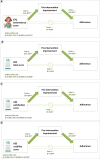Predictors of users' adherence to a fully automated digital intervention to manage insomnia complaints
- PMID: 37672004
- PMCID: PMC10654843
- DOI: 10.1093/jamia/ocad163
Predictors of users' adherence to a fully automated digital intervention to manage insomnia complaints
Abstract
Objective: Fully automated digital interventions show promise for disseminating evidence-based strategies to manage insomnia complaints. However, an important concept often overlooked concerns the extent to which users adopt the recommendations provided in these programs into their daily lives. Our objectives were evaluating users' adherence to the behavioral recommendations provided by an app, and exploring whether users' perceptions of the app had an impact on their adherence behavior.
Material and methods: Case series study of individuals completing a fully automated insomnia management program, conducted by a virtual agent, during December 2020 to September 2022. Primary outcome was self-reported adherence to the behavioral recommendations provided. Perceptions of the app and of the virtual agent were measured with the Acceptability E-Scale and ECA-Trust Questionnaire. Insomnia was evaluated with the Insomnia Severity Index at baseline (phase 1), after 7 days of sleep monitoring (phase 2) and post-intervention (phase 3).
Results: A total of 824 users were included, 62.7% female, mean age 51.85 (±12.55) years. Of them, 32.7% reported having followed at least one recommendation. Users' trust in the virtual agent and acceptance of the app were related to a pre-intervention effect in insomnia severity (phase 2). In turn, larger pre-intervention improvements predicted better adherence. Mediational analyses showed that higher levels of trust in the virtual agent and better acceptance of the app exerted statistically significant positive effects on adherence (β = 0.007, 95% CI, 0.001-0.017 and β = 0.003, 95% CI 0.0004-0.008, respectively).
Discussion: Users' adherence is motivated by positive perceptions of the app's features and pre-intervention improvements.
Conclusions: Determinants of adherence should be assessed, and targeted, to increase the impact of fully automated digital interventions.
Keywords: insomnia; mobile health; treatment adherence.
© The Author(s) 2023. Published by Oxford University Press on behalf of the American Medical Informatics Association. All rights reserved. For permissions, please email: journals.permissions@oup.com.
Conflict of interest statement
None declared.
Figures




Similar articles
-
Perceptions and Effectiveness of a Fully Automated Brief Behavioral Insomnia Therapy, Delivered by a Virtual Companion, in Older and Young Adults.Innov Aging. 2024 Sep 24;9(2):igae086. doi: 10.1093/geroni/igae086. eCollection 2025. Innov Aging. 2024. PMID: 40206328 Free PMC article.
-
Smartphone-Based Virtual Agents to Help Individuals With Sleep Concerns During COVID-19 Confinement: Feasibility Study.J Med Internet Res. 2020 Dec 18;22(12):e24268. doi: 10.2196/24268. J Med Internet Res. 2020. PMID: 33264099 Free PMC article.
-
Determinants of Dropout From a Virtual Agent-Based App for Insomnia Management in a Self-Selected Sample of Users With Insomnia Symptoms: Longitudinal Study.JMIR Ment Health. 2025 Jan 15;12:e51022. doi: 10.2196/51022. JMIR Ment Health. 2025. PMID: 39815642 Free PMC article.
-
Mobile App Use for Insomnia Self-Management in Urban Community-Dwelling Older Korean Adults: Retrospective Intervention Study.JMIR Mhealth Uhealth. 2020 Aug 24;8(8):e17755. doi: 10.2196/17755. JMIR Mhealth Uhealth. 2020. PMID: 32831177 Free PMC article.
-
Psychological treatment for insomnia in the regulation of long-term hypnotic drug use.Health Technol Assess. 2004 Feb;8(8):iii-iv, 1-68. doi: 10.3310/hta8080. Health Technol Assess. 2004. PMID: 14960254 Review.
Cited by
-
Perceptions and Effectiveness of a Fully Automated Brief Behavioral Insomnia Therapy, Delivered by a Virtual Companion, in Older and Young Adults.Innov Aging. 2024 Sep 24;9(2):igae086. doi: 10.1093/geroni/igae086. eCollection 2025. Innov Aging. 2024. PMID: 40206328 Free PMC article.
-
Efficacy of eHealth Versus In-Person Cognitive Behavioral Therapy for Insomnia: Systematic Review and Meta-Analysis of Equivalence.JMIR Ment Health. 2024 Aug 26;11:e58217. doi: 10.2196/58217. JMIR Ment Health. 2024. PMID: 39186370 Free PMC article.
References
-
- Morin CM, Jarrin DC.. Epidemiology of insomnia: prevalence, course, risk factors, and public health burden. Sleep Med Clin. 2022;17(2):173-191. - PubMed
-
- Qaseem A, Kansagara D, Forciea MA, Cooke M, Denberg TD; Physicians CGCotACo. Management of chronic insomnia disorder in adults: a clinical practice guideline from the American College of Physicians. Ann Intern Med. 2016;165(2):125-133. - PubMed
-
- Schmitz MF. The ACP guidelines for treatment of chronic insomnia: the challenge of implementation. Behav Sleep Med. 2016;14(6):699-700. - PubMed
Publication types
MeSH terms
Grants and funding
LinkOut - more resources
Full Text Sources
Medical

